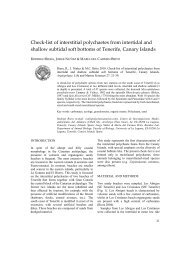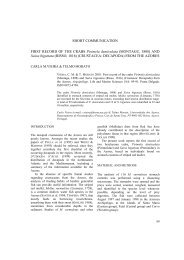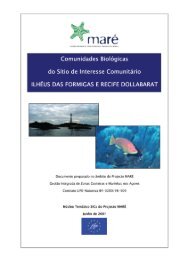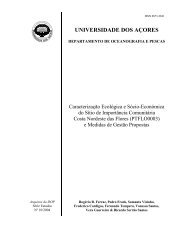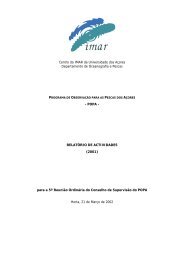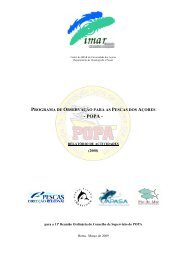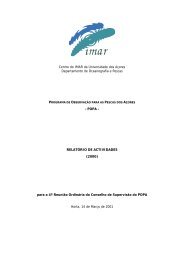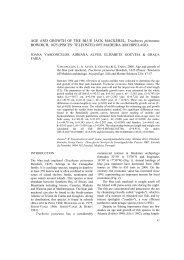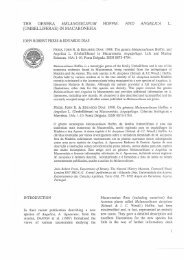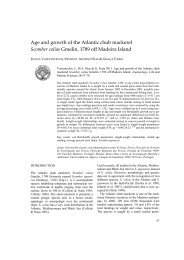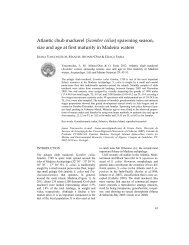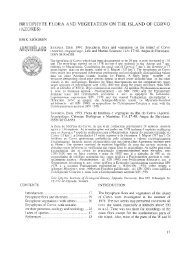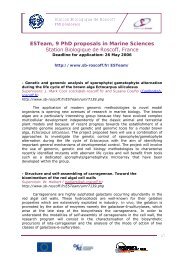relatório actividades de j - DOP/UAç - Universidade dos Açores
relatório actividades de j - DOP/UAç - Universidade dos Açores
relatório actividades de j - DOP/UAç - Universidade dos Açores
You also want an ePaper? Increase the reach of your titles
YUMPU automatically turns print PDFs into web optimized ePapers that Google loves.
esults of this study will convey a revision of the taxonomic status of this species<br />
listed in Annex I of the EC Birds Directive, which is expected to result in the<br />
recognition of two distinct species with an increased vulnerable status, requiring<br />
immediate conservation measures.<br />
Regarding cetaceans, a database of the present populations of the different<br />
species will be compiled and the consequence of the increasing touristic<br />
pressure due to whale watching for the populations will be monitored. This is a<br />
recent activity in the Azores, but a large expansion is expected since it is the<br />
region in the North Atlantic with the highest diversity of cetaceans. A special<br />
importance is given to the resi<strong>de</strong>nt groups of Tursiops truncatus (species<br />
inclu<strong>de</strong>d in Annex II of the EC Habitats Directive). The data collected will be used<br />
in calculating the capacity load for the whale watching and in elaborating and<br />
implementing a complex of management measures, which could lead to the<br />
proposal of new protection areas.<br />
Concerning marine turtles, the present project will seek to supervise tagging,<br />
access the impacts of acci<strong>de</strong>ntal capture of turtles by the fishing fleet and study<br />
the distribution of the populations. The results of these studies will help in<br />
adopting practical measures for protecting the different species of turtles,<br />
especially the loggerhead (Caretta caretta), a priority species of the “Habitats<br />
Directive”, which has its nursery ground around the Azores on its migratory route<br />
in the North Atlantic.<br />
VENTOX – Deep-Sea hydrothermal vents: a natural pollution laboratory.<br />
UE – EVK3-CT1999-00003<br />
The VENTOX project is inten<strong>de</strong>d to un<strong>de</strong>rpin this important European<br />
en<strong>de</strong>avour by providing innovative insights into the long-term (i.e. evolutionary)<br />
adaptations of a unique group of organisms, the <strong>de</strong>ep-sea hydrothermal fauna<br />
(and associated microbes), which are unique amongst life on earth in having<br />
been exposed to high levels of environmental contamination (low pH, high CO 2,<br />
poisonous sulphi<strong>de</strong>s, heavy metals and hazardous radionucli<strong>de</strong>s) throughout<br />
their evolutionary history. Furthermore, vent species have shallow-water<br />
relatives that are important both in terms of biodiversity (community structure)<br />
and commercial exploitation (e.g. shellfish). The evolutionary adaptations and<br />
responses of vent species to their highly toxic and hostile environment are<br />
therefore extremely relevant to our un<strong>de</strong>rstanding of the short and long-term<br />
consequences of contaminant exposure in shallow-water marine ecosystems.<br />
The contaminant history of the <strong>de</strong>ep-sea vent fauna extends back to at least the<br />
Mesozoic (further in the case of vent bacteria); by comparison, anthropogenic<br />
pollution is only a very recent phenomenon (covering the past 100 years).<br />
Without such a long-term, evolutionary perspective on contaminant impact in<br />
marine ecosystems, it is not possible to consi<strong>de</strong>r the <strong>de</strong>velopment of truly viable<br />
long-term management strategies.<br />
The primary objective of this RTD proposal is to carry out innovative research<br />
into the specialised adaptations and processes found in representatives of the<br />
6



